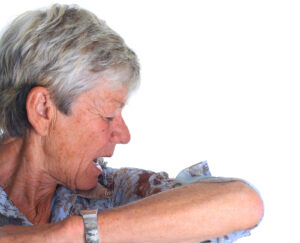How to Tell the Difference Between Seasonal Allergies, Colds, and COVID
It’s been over a year since COVID-19 hit the U.S. In that time, the virus has mutated. Each step of the way, people are learning more about the disease. One area that still challenges families is how to know the difference between colds, seasonal allergies, and the COVID-19 virus.
You can’t go help your mom out if you’re contagious, but she needs your help. You’re torn. How do you tell if you may have the virus or simply have a cold or allergies?
Common Symptoms of Allergies

Senior Care Memorial, TX: Seasonal Allergies, Colds, and COVID
If you’re sneezing a lot, it’s likely allergies. Sneezing, a runny nose, congestion, and itchy/watery eyes are the most common signs of an allergy. If you’re experiencing allergies, closing the windows in your home and running an air purifier may help.
Allergy medications can help with nasal congestion and runny nose. It can also help with itchy, watery eyes. You might want to use allergy eye drops if your eyes’ symptoms are particularly annoying.
Common Symptoms of Colds
Colds have many of the same symptoms as allergies, but there are a few differences. With a cold, you may feel achy. Fever is unlikely and is often low-grade if there is one.
With a cold, you won’t get the itchy, watery eyes that you get with allergies. A sore throat is likely, and that’s not common with allergies. You may feel nauseous, which isn’t expected with seasonal allergies.
Cold medications that help with body aches, congestion, and congestion are helpful. You should also make sure you’re drinking plenty of fluids like broth, water, juice, and tea.
Common Symptoms of COVID-19
One thing that happens with COVID-19 that’s not as likely in colds or allergies is the fever. Symptoms vary in intensity, but a fever, cough, loss of smell, and loss of taste are common. Nasal congestion is not common.
If you think you could have COVID-19, you need to stay away from your mom for 14 days. Get tested if possible. Stay home unless the symptoms become severe. If that happens, call your doctor about getting admitted to the hospital for care. Otherwise, isolate yourself from others, even those in your home, as you are contagious even if you don’t feel sick.
If you are sick, consider respite care services from a local senior care agency. You don’t want to spread your illness to your mom. Her immune system may not be as effective as yours. Stay home and let senior care aides help her until you feel better.
If you or an aging loved one are considering Senior Care in Memorial, TX, contact the caring staff at Personal Caregiving Services at 832-564-0338. Providing Care in Houston, Bellaire, West University Place, Katy, and Sugar Land and the surrounding areas.
- Why Maintaining Flexibility Is So Important For Seniors - April 3, 2025
- Home Care Assistance Helps Seniors Manage Medical Appointments - March 19, 2025
- Symptoms and Causes of Edema in the Legs and Feet - March 5, 2025
